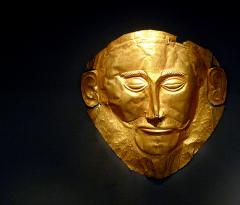
As the cast of Agamemnon gears up to take on this classic Greek Tragedy, my research has been extensive in helping the actors learn more about their characters. The beauty (and sometimes the curse) of Greek theatre is that many of the people we encounter in a play might very well show up somewhere else: another play, an epic poem, or the wide expanse of mythology. Agamemnon might be the first text in The Oresteia trilogy, but it's certainly not the beginning of the story of Agamemnon and his wife, Clytemnestra.
But let's begin at the very beginning and figure out how Agamemnon and Clytemnestra got themselves into the muddy and bloody mess we're going to see onstage in the Heymann Theatre. The Curse of the House of Atreus begins much farther back than Atreus himself. Agamemnon's great-grandfather Tantalus was descended from the gods, but he foolishly wanted to test their powers of omniscience. Tantalus killed his son, Pelops, and attempted to serve the meat to the gods at dinner. Omniscience Successfully Tested: the gods figured it out before tasting anything and threw Tantalus into the underworld for his impudence. There he resides to this day, eternally standing in a pool of water that recedes when he tries to drink it, under a fruit tree that rises out of his grasp when he tries to eat. You'll never use the word "tantalize" the same way again.
The gods brought Pelops back to life, but he was destined to live out the curse Tantalus had brought down on the family. Pelops devised the death of his future-father-in-law, King Oenomaus, in a chariot race. He and the king's charioteer, Myrtilus, replaced the bronze pins that held the king's wheels to the chariot's axle with fake pins of beeswax. King Oenomaus was dragged to death by his horses near the end of the race, but Myrtilus survived. Accounts differ on why Pelops decided to kill Myrtilus, but as Pelops was throwing him over a cliff into the sea, Myrtilus heaped another dosage of curse on the family.
Pelops had twin sons, Atreus and Thyestes. While there was a good deal of political intrigue that happened between the brothers, infidelity was the straw that broke the camel's back. Atreus discovered that his wife was having an affair with Thyestes, so "like grandfather, like grandson" Atreus killed Thyestes' two sons and baked them into a pie for their father to eat. During his exile from the kingdom for eating human flesh, Thyestes visited an oracle who told him how to exact revenge: the son that was born out of an incestuous affair between Thyestes and his daughter would one day kill Atreus.
Atreus had two sons before Aegisthus finally did him in: Agamemnon and Menelaus. The two brothers married a pair of sisters, now some of the most famous women in Greek mythology. Agamemnon married Clytemnestra, and Menelaus married Helen. Helen was stolen away, as many of us know, by Paris and taken to Troy. Menelaus swore to get her back an enlisted Agamemnon to rally the troops to sail away for a battle in Troy. But no wind came. The army sat becalmed in the harbor until the seer Calchas told Agamemnon that the winds would blow again if he sacrificed his daughter, Iphigenia, to the gods. Euripides wrote the play Iphigenia at Aulis, which depicts Agamemnon's deceptive plan to bring Clytemnestra and Iphigenia to Aulis and sacrifice the young virgin so the army can sail for Troy.
Atreus Family Tree
Menelaus and Agamemnon fight in the Trojan War for ten long years, and Aeschylus' play begins as Troy falls in defeat and Agamemnon begins his journey home. Clytemnestra and Aegisthus have united forces while he was away, and, boy, have they had time to plan a welcome back party. No more spoilers, except to say that the Curse of the House of Atreus doesn't end here. Read the rest of The Oresteia to find out what happens to Agamemnon's children!